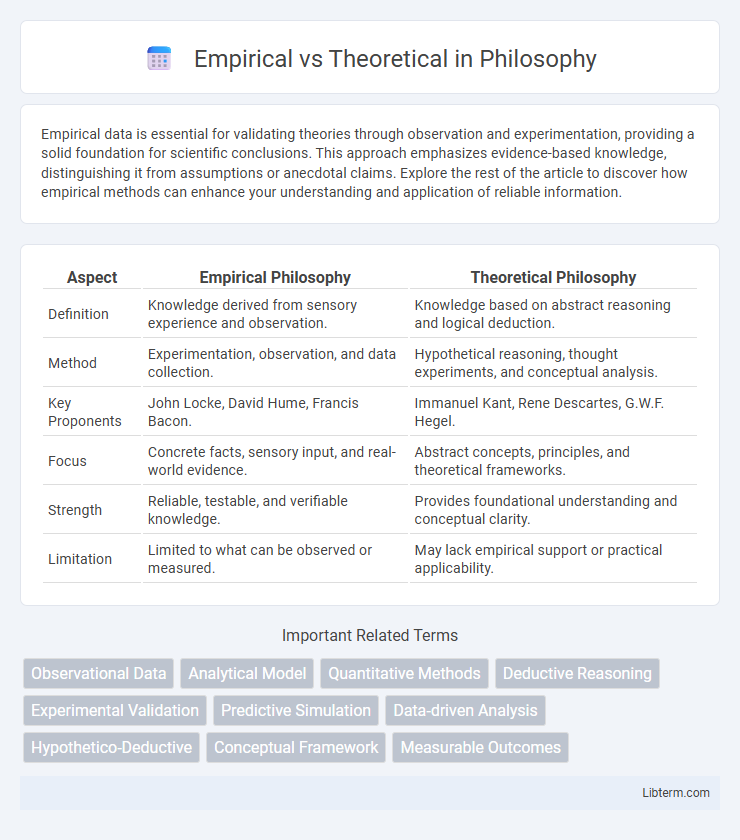Empirical data is essential for validating theories through observation and experimentation, providing a solid foundation for scientific conclusions. This approach emphasizes evidence-based knowledge, distinguishing it from assumptions or anecdotal claims. Explore the rest of the article to discover how empirical methods can enhance your understanding and application of reliable information.
Table of Comparison
| Aspect | Empirical Philosophy | Theoretical Philosophy |
|---|---|---|
| Definition | Knowledge derived from sensory experience and observation. | Knowledge based on abstract reasoning and logical deduction. |
| Method | Experimentation, observation, and data collection. | Hypothetical reasoning, thought experiments, and conceptual analysis. |
| Key Proponents | John Locke, David Hume, Francis Bacon. | Immanuel Kant, Rene Descartes, G.W.F. Hegel. |
| Focus | Concrete facts, sensory input, and real-world evidence. | Abstract concepts, principles, and theoretical frameworks. |
| Strength | Reliable, testable, and verifiable knowledge. | Provides foundational understanding and conceptual clarity. |
| Limitation | Limited to what can be observed or measured. | May lack empirical support or practical applicability. |
Introduction to Empirical and Theoretical Approaches
Empirical approaches rely on observation, experimentation, and data collection to derive conclusions grounded in real-world evidence. Theoretical approaches emphasize abstract models, hypotheses, and logical reasoning to predict phenomena without immediate reliance on experimental data. Both methods are integral to scientific inquiry, complementing each other by balancing practical measurement with conceptual frameworks.
Defining Empirical Research
Empirical research involves collecting and analyzing data through direct observation or experimentation to gain knowledge based on real-world evidence. It contrasts with theoretical research, which relies on abstract models and hypotheses without direct data collection. Defining empirical research centers on its systematic approach to testing hypotheses through measurable and observable phenomena.
Understanding Theoretical Frameworks
Theoretical frameworks provide structured concepts and principles that guide scientific inquiry, enabling researchers to develop hypotheses grounded in established knowledge. Empirical methods rely on observation and experimentation to test these hypotheses, validating or refining the theoretical constructs. Understanding theoretical frameworks is essential for interpreting empirical data and advancing knowledge across disciplines.
Key Differences Between Empirical and Theoretical Methods
Empirical methods rely on observation, experimentation, and data collection to derive conclusions, emphasizing real-world evidence and measurable results. Theoretical methods focus on abstract models, hypotheses, and logical reasoning to predict phenomena, often without immediate experimental validation. Key differences include empirical methods being data-driven and practical, while theoretical methods are concept-driven and speculative.
Advantages of Empirical Approaches
Empirical approaches offer the advantage of grounding conclusions in observable and measurable evidence, which enhances the reliability and validity of research findings. These methods allow for direct testing and refinement of hypotheses through experimentation and real-world data collection. This practical basis supports the development of solutions and theories that are closely aligned with actual phenomena and behaviors.
Benefits of Theoretical Analysis
Theoretical analysis provides a structured framework to predict outcomes and understand underlying principles without the constraints of experimental limitations. It allows for the exploration of numerous scenarios quickly and cost-effectively, enabling the identification of optimal strategies before empirical testing. This approach enhances hypothesis formulation and supports the development of generalized models applicable across various contexts.
Limitations of Empirical Studies
Empirical studies often face limitations such as sample bias, measurement errors, and difficulty in establishing causality due to uncontrolled variables. The reliance on observable data restricts the scope of findings, making it challenging to generalize results across different contexts or populations. Furthermore, empirical research can be constrained by temporal and resource limitations affecting data accuracy and depth.
Challenges in Theoretical Research
Theoretical research faces challenges such as abstract modeling limitations and the difficulty of validating hypotheses without empirical data. Complex mathematical frameworks can lead to oversimplification or unrealistic assumptions, hindering practical application. Moreover, bridging the gap between theory and observable phenomena requires innovative methodologies and interdisciplinary collaboration.
Real-World Applications: Empirical vs. Theoretical
Empirical approaches rely on data gathered through observation and experimentation, providing practical insights that directly inform real-world applications such as engineering, medicine, and social sciences. Theoretical methods use abstract models and simulations to predict outcomes and explain phenomena, often serving as the foundation for developing new technologies and scientific principles. Combining empirical evidence with theoretical frameworks enhances accuracy and innovation in fields like climate science, economics, and artificial intelligence.
Choosing the Right Approach: Empirical or Theoretical?
Choosing the right approach between empirical and theoretical methods depends on the research goal and data availability. Empirical research relies on observed and measured data to validate hypotheses, making it ideal for exploring practical, real-world phenomena. Theoretical research develops models and frameworks to explain underlying principles, offering deep insights when direct data is scarce or experiments are impractical.
Empirical Infographic

 libterm.com
libterm.com